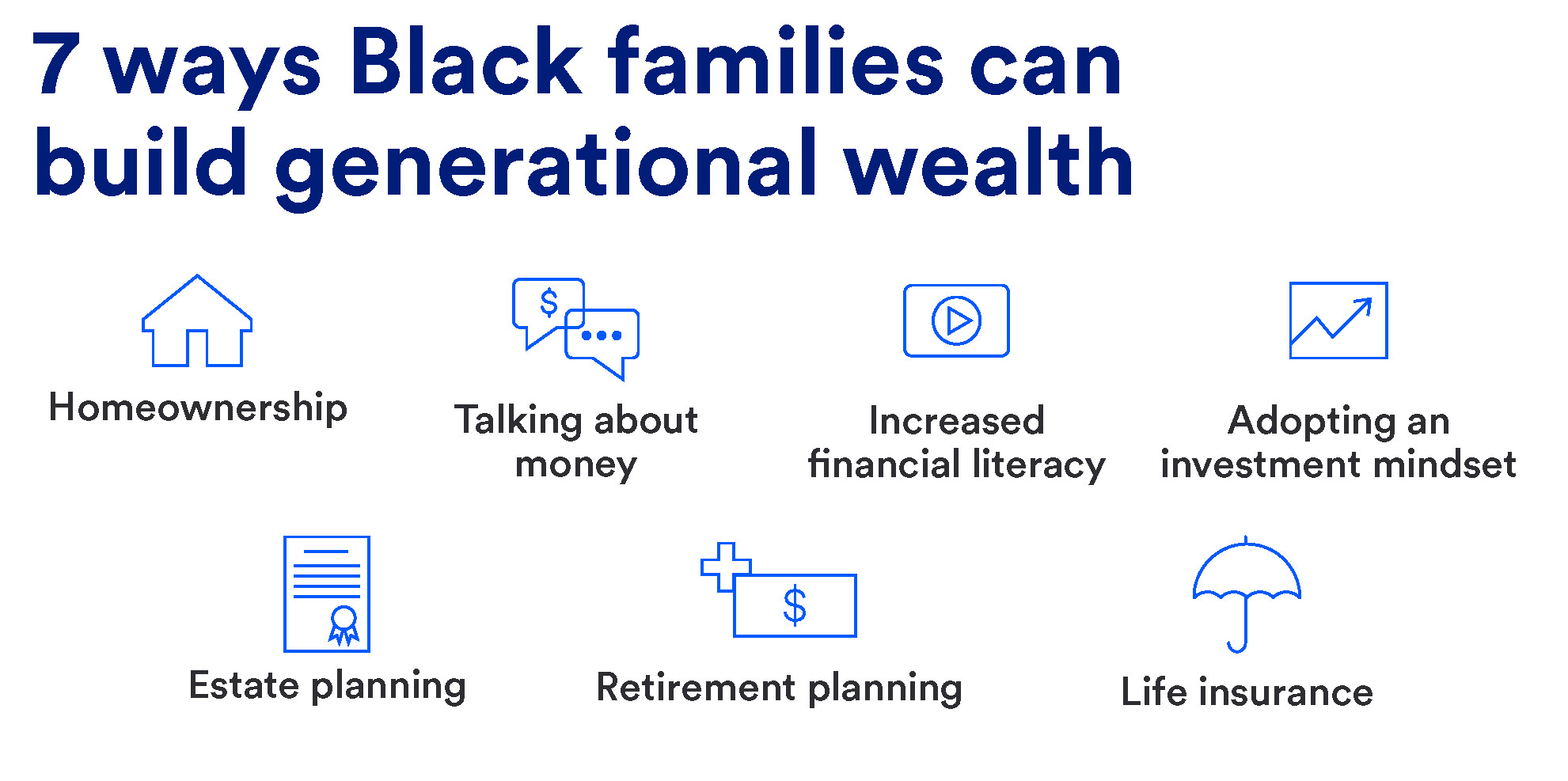
Historic systemic barriers have left the typical Black American family with just 16% the wealth of the typical white family,1 which can inhibit Black families’ ability to build generational wealth.
While homeownership is one of the best ways to begin building generational wealth, other strategies include investing in retirement accounts, establishing an estate plan and taking out life insurance policies.
Having wealth to pass on to the next generation is a privilege, especially if building wealth is a challenge. This is the case for many Black families. According to the Federal Reserve, because of systemic barriers – including racial discrimination in housing, employment and banking – the typical white family has six times the wealth of the typical Black family.1
What is generational wealth?
Generational wealth refers to the financial assets that one generation passes down to the next. These assets could be property, investments, cash or other things of monetary value. Over the years, these assets can increase in value, creating a growing legacy for subsequent generations.
“The biggest impediment to Black generational wealth has been the lack of access to homeownership in a world where about 75% of Americans’ wealth is tied to the value of their homes,1” says Scott Ford, president of U.S. Bank Wealth Management. “Redlining policies or higher mortgage rates may have kept you from buying a home, which in many cases is what initiates the ability to pass wealth along to your children and subsequent generations.”
That said, there are other tools that can help Black families establish a legacy of wealth for future generations.

Building generational wealth: Start with a retirement plan
If you’re not already taking advantage of an employer-sponsored retirement plan, it’s time to start. Or, if you’re only investing the bare minimum in that plan, increase your contribution. Learn about the benefits of long-term investing, the power of compounding interest, the impact of inflation and the risk-reward tradeoff.
“African Americans tend to be more risk averse than other investors,” says Ford, “but what they don’t always understand is just how much their investments are going to grow over a 30-year timeframe, versus just leaving that money in a bank account.”
It doesn’t have to be a time-consuming activity, either, but “it may require adopting a new mindset of ‘paying yourself first,’” adds Ford. For example, by automating contributions to any retirement plans, money market accounts or savings accounts, you can sock away money both for your own retirement and for the benefit of future generations.
Also, setting up a systematic transfer to your savings account for every paycheck is an effective way to start building a nest egg without much additional effort. Just make sure all accounts have a transfer-on-death provision, which allows you to leave the account’s assets to one or multiple different individuals.
Change your mindset about discussing generational wealth
“In many Black households, money is almost a taboo topic,” Ford says. “You don’t ask your parents how much they make or how they pay the bills. By the time young African Americans come into adulthood, they may not understand credit, how to manage a checking account or how to invest.”
There are many ways to incorporate financial education into family life. Simply talking to family members about money and personal finances is a great place to start, too.
Ford notes that gaining financial literacy, delaying financial gratification, understanding the value of attending college or starting a business may all require some extra time and effort, but they’re crucial steps in building lasting wealth for Black families.
The importance of a financial plan to generational wealth
Ford sees excellent potential for individuals who want to adopt a long-term financial approach that leverages higher education, homeownership, employer retirement plans and other wealth-building opportunities. A financial plan is important component of this effort.
First, assess your current financial status, including total income, total debt, any retirement savings and so forth. Then—ideally with the help of a financial professional—you can create a financial plan that factors in that current status, plus your future goals and what needs to happen to achieve those objectives.
“There's no easier way to pass on generational wealth than to have a life insurance policy with named beneficiaries. It’s a tax-free wealth creation tool that allows you to leave an even bigger legacy for future generations.”
Scott Ford, president of U.S. Bank Wealth Management
With this baseline established, you'll have a clear line of sight as to what decisions or changes you need to make to start building generational wealth.
Other tools for building generational wealth
- Life insurance. Taking out a life insurance policy is another effective way for Black families to build generational wealth. “There's no easier way to pass on generational wealth than to have a life insurance policy with named beneficiaries,” Ford says. “It’s a tax-free wealth creation tool that allows you to leave an even bigger legacy for future generations.”
- An estate plan. As your assets grow, you’ll want to ensure that they will be distributed after your death according to your wishes. An estate plan includes documents like a will, trusts and a living will.
- Power of attorney. This is an important part of an estate plan, ensuring your wishes are on record if you ever need someone to make financial or healthcare decisions on your behalf.
Overcoming the racial wealth gap and building generational wealth can require mindset shifts that do not happen overnight. Rather than trying to address all aspects simultaneously, break them down and focus on them one at a time.
“The onus to educate yourself, begin investing, take out a life insurance policy and draw up a financial plan is on each individual; this isn’t something that society can impose,” says Ford. “The education and resources are available, but each person is responsible for their own wealth creation, which doesn’t just happen naturally. You have to be intentional and deliberate about it.”
Get more insights and resources designed to help you work toward your goals.
Tags:
Related articles

How to set financial goals
Setting and working toward financial goals becomes easier when you reflect on your intentions.

Investing through employer sponsored retirement plans
Employer retirement plans allow you to invest with ease while working toward financial security. These tips will help you maximize the benefits.